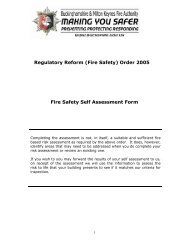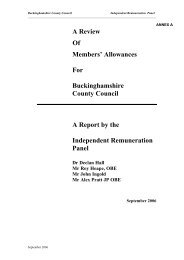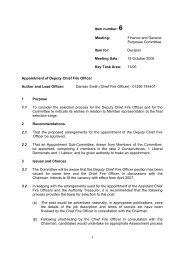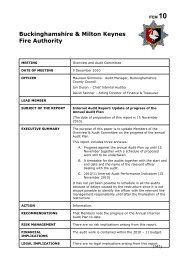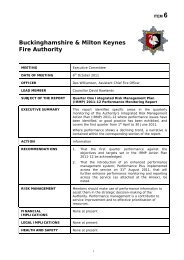Managing Underperformance Policy and Procedure
Managing Underperformance Policy and Procedure
Managing Underperformance Policy and Procedure
You also want an ePaper? Increase the reach of your titles
YUMPU automatically turns print PDFs into web optimized ePapers that Google loves.
1. POLICY STATEMENT<br />
• The Authority recognises the need for a clear, fair <strong>and</strong> consistent policy <strong>and</strong> procedure<br />
for managing performance.<br />
• The organisation recognises the importance of individual performance <strong>and</strong> will endeavour to<br />
ensure that employees achieve <strong>and</strong> maintain a high st<strong>and</strong>ard of performance in their work by<br />
providing appropriate training <strong>and</strong> support to meet these st<strong>and</strong>ards. To this end the<br />
organisation will establish fair <strong>and</strong> achievable st<strong>and</strong>ards that are communicated clearly by line<br />
managers <strong>and</strong> performance is monitored.<br />
• It is further recognised that there are occasions when an individual’s performance may not<br />
meet the expected st<strong>and</strong>ards. In these circumstances the aim of the Authority is to support<br />
the employee to improve their performance within a timeframe to meet the needs of the<br />
Service <strong>and</strong> reasonable expectations on the employee. This will be achieved through the<br />
provision of appropriate resources; training, coaching <strong>and</strong> counselling to assist employees to<br />
develop in their role.<br />
• The <strong>Managing</strong> <strong>Underperformance</strong> procedure has been designed to ensure that concerns over<br />
performance are dealt with fairly <strong>and</strong> transparently <strong>and</strong> that steps are taken to establish the<br />
facts.<br />
• Where is it found that poor performance is within the employees control or wilful ie<br />
negligence, carelessness or unwillingness by the individual to co-operate in any training or<br />
development then the Disciplinary <strong>Procedure</strong> will be applied.<br />
• Where an employee is incapable of performing their duties due to long term ill health, then the<br />
‘Health & Sickness Absence’ policy applies.<br />
2. APPLICATION<br />
Scope<br />
• This policy applies to all employees directly employed by the Authority on permanent <strong>and</strong><br />
fixed term contracts of employment with the exception of the Chief Fire Officer for whom a<br />
separate procedure applies.<br />
• This policy <strong>and</strong> procedure will not apply to employees on probation period.<br />
• This policy does not apply to agency workers contracted to work through a temporary agency.<br />
3. RESPONSIBILITIES<br />
Employees are responsible for their performance.<br />
Line Managers are responsible for clearly communicating the st<strong>and</strong>ard required by the organisation to<br />
the employee. They are also responsible for providing, support <strong>and</strong> guidance to meet the required<br />
st<strong>and</strong>ard expected.<br />
Line Managers will provide the necessary training, development <strong>and</strong> coaching <strong>and</strong> provide a<br />
reasonable period of time for the employee to acquire relevant skills. Line Managers will regularly<br />
review performance matters with all employees against their TAPS/Performance Objectives.<br />
Department: Human Resources<br />
Author: Catherine Moroney - HR<br />
Approval: <strong>Policy</strong> Development Forum/St<strong>and</strong>ards Committee<br />
Issue number: 02<br />
Issue date: 14.09.08<br />
Review Date: In line with new legislation/codes of practice




